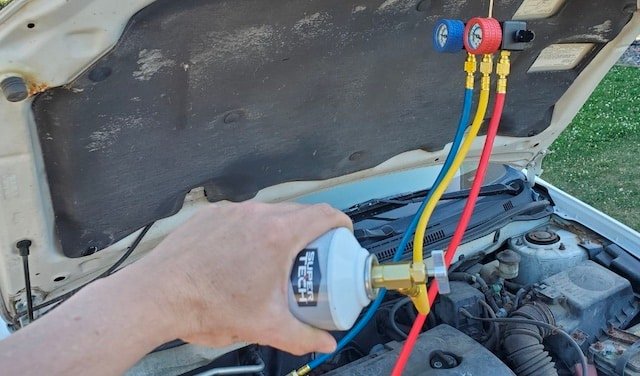When your Camry’s air conditioner fails to cool the interior of the vehicle – or worse, is blowing some terrible warm air – it could signal a serious problem with the cooling system. It could also mean that your cooling system might be having some maintenance issues that can be fixed by checking a few components.
The solution to the problem would depend on what’s up with the air conditioning system – If it is blowing warm air or if it is not blowing air at all.
If the air conditioning system is not blowing air at all, then you might be having issues with the blower motor which will stop the fan from creating airflow. There could also be issues with the cable controlling airflow and other systems involved.
If you’re having issues with air not coming out of the vents or air not blowing at all, it would be best to have your mechanic look at it.

Toyota Camry AC Not Working: Common Causes
There are a few reasons why your car’s air conditioning is not working as expected. You can fix some of these issues on your own But some issues can be so serious, you’d have to visit the mechanic.
Here are the 3 common culprits behind a malfunctioning AC in the Toyota Camry
- AC refrigerant leak
- Climate control electrical issue
- Faulty AC compressor
Toyota Camry AC Not Working: How to Fix
Here are some things to do to fix the issues. While you might not be able to fix all the issues on your own, it sure helps to at least understand where the problem lies.
Check For AC refrigerant leaks
Your car’s air conditioning relies on refrigerant to cool the air before it is blown through the vents into the interior of the vehicle. The refrigerant is a fluid designed to vaporize at a low temperature and if it is leaking from the AC system, it will not be able to perform at full capacity which means you might experience warm air blowing from the vents.
An AC refrigerant leak could be due to a leak in a faulty component within the system which could come from the compressor, evaporator, or hoses. It could also be a sign of age in an older vehicle. This could be due to the parts and hoses using rubber seals wearing off with time which could result in a leak.
Damage due to accidents can cause refrigerant leaks. Flying road debris and other objects from impacts can cause damage to the AC condenser located right in front of the radiator. Another possible cause could be the AC hoses and pipes rubbing against other parts of the car while you drive.
To confirm that you’re having an air refrigerant leak, you need to listen to the AC compressor. When the AC is turned on, you should hear an audible click from the engine area. This is the AC compressor clutch being engaged which allows the compressor to operate.
If the system is low on refrigerant, the compressor will cycle on and off more often. If it is very low, then the compressor won’t turn on at all. To confirm that there is a refrigerant leak.
- Listen for a hissing from the air conditioning system
- Check for oil residue from or around the hoses and pipe fittings
- Check the condenser in front of the radiator for damage
- You can use a special tool that can detect AC refrigerant gas to check for leaks.
- If you add ultraviolet dye to the refrigerant, you can use infrared light to detect the ultraviolet dye.
It would be best to have the system checked for leaks. You may notice a leak in a specific part of the AC system which would have to be repaired or replaced.
A full AC recharge might be required to flush the system if too much refrigerant has already been lost. Thereafter, you should replace it with the right amount of refrigerant and the AC should function properly and blow cold air.
Check the HVAC controls for faults
The HVAC or temperature control panel is fitted with buttons, knobs, and touchscreens to help you control the AC/heater system. This passes instructions to the heating and cooling system allowing a certain amount of cold air into the interior of the vehicle.
A control system is basically an electrical tool that could break down or the parts supporting it could break down and stop it from functioning properly. This could be the wiring which would stop the car’s AC from working.
For this fix, you would have to get a mechanic to check out the electronics. The mechanic will inspect the entire system and its components to ascertain the damage and then repair or replace the faulty parts. You could help hasten the fix by explaining the symptoms to the mechanic before they start working on the vehicle.
Fix the AC compressor
The AC compressor is a very important part of the car’s cooling system. If it is faulty, then the refrigerant won’t flow efficiently through the system and your car won’t get chill when you turn on the air conditioning system.
In some cases, the problem with the AC compressor could be due to the belt, low refrigerant, or that there is no proper power supply to the compressor.
In other cases, it would be a serious problem that would require you to replace the AC compressor. If you have to replace the AC compressor then you might have to perform a few more fixes. This would involve flushing the system and replacing the actuator.
To confirm that the compressor is at fault and would need to be replaced or its surrounding parts fixed, you should have your mechanic check the vehicle. The mechanic should be able to determine the actual cause of the problem and the fix that would be needed to get it working again.
Final Thoughts
In most cases, the issue would be coming from the refrigerant. Ensure you’re using the right refrigerant for your air conditioning system as using the wrong one could cause some serious damages. You should check for a refrigerant leak or get your mechanic to inspect the system and its components for any signs of leaks.







